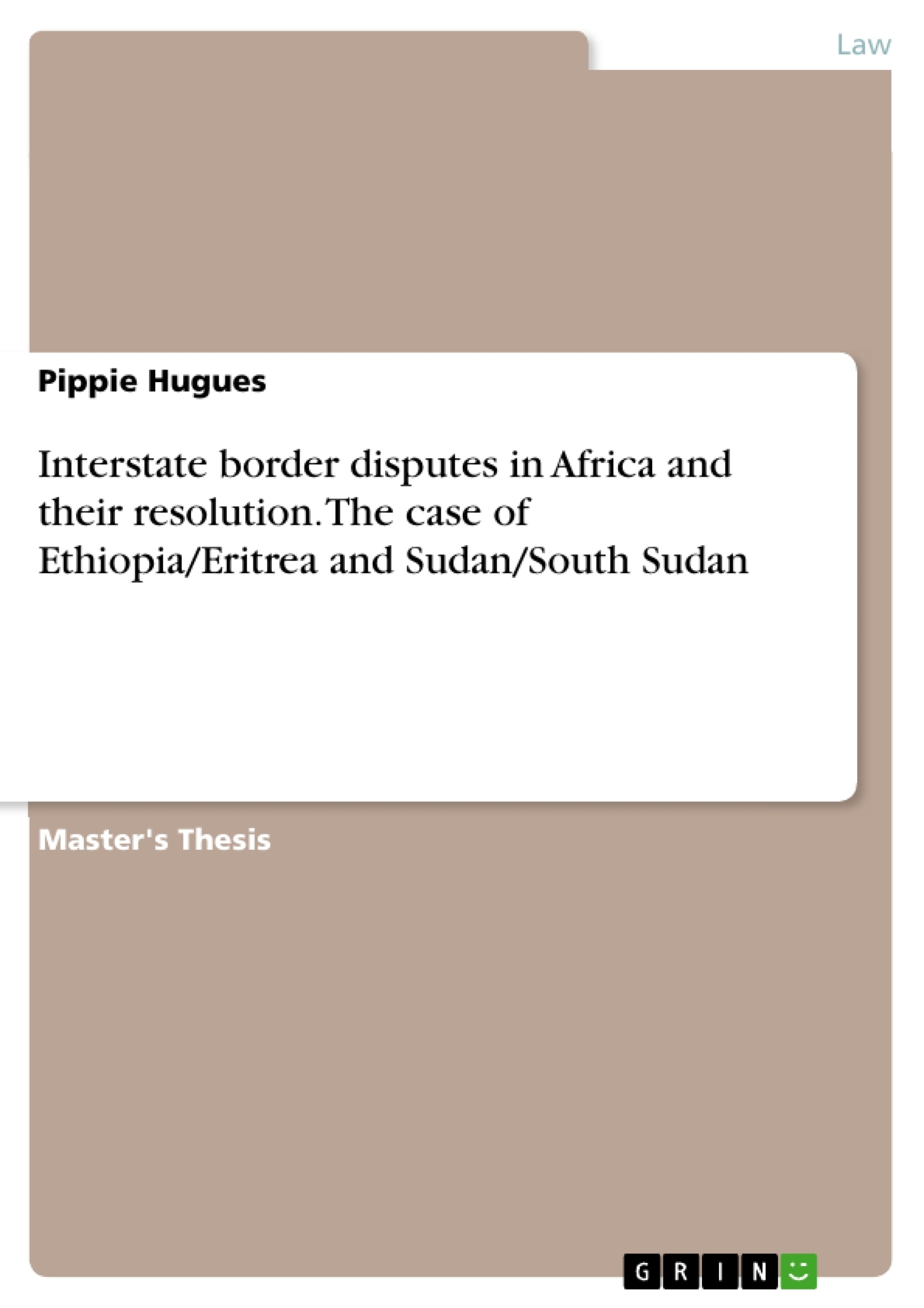The purpose of this research is to critically examine the resolution of interstate border disputes in Africa. In doing so, the disputes between Sudan and South Sudan over the Abyei and Heglig zones and the dispute between Ethiopia and Eritrea over Badme will be the main focus of the study. The main research question is: How effective are the laws and mechanisms put in place to resolve interstate border disputes in Africa?
Africa as a continent is covered with a lot of interstate border disputes. It is true that international law has always considered as one of its fundamental purposes the maintenance of peace. Disputes are inevitable and no matter their nature, they are often accepted as a regular part of human relations. The major problem is always how to resolve them. The history of the African continent is characterized by interstate border disputes, which usually occurs around the border between two states, but also involve many other states. Most of the interstate disputes occur after the states become independent, when each becomes eager to know and secure its territorial boundaries with neighbours.
Table of Contents
- ABSTRACT
- LIST OF CASES
- LIST OF STATUTES.
- CHAPTER ONE: INTRODUCTION
- 1.1 Background of the Study
- 1.2 Statement of the Problem
- 1.3 Aim and Objectives of the Study
- 1.4 Research Questions
- 1.5 Scope of the Study
- 1.6 Methodology
- 1.7 Significance of the Study
- 1.8 Organization of the Study
- CHAPTER TWO: CONCEPTUAL FRAMEWORK
- 2.1 Defining Key Concepts
- 2.2 Perpetual Peace Theory
- 2.3 Theories of International Law
- 2.4 Border Disputes: A Review of the Literature
- 2.5 The African Union as a Regional Organization
- CHAPTER THREE: THE LEGAL FRAMEWORK FOR THE RESOLUTION OF INTERSTATE BORDER DISPUTES IN AFRICA
- 3.1 The International Court of Justice (ICJ)
- 3.2 The African Union Commission
- 3.3 The African Charter on Human and Peoples' Rights
- 3.4 The Role of the United Nations in Dispute Resolution
- CHAPTER FOUR: CASE STUDIES
- 4.1 The Ethiopia-Eritrea Border Dispute
- 4.2 The Sudan-South Sudan Border Dispute
- CHAPTER FIVE: ANALYSIS AND DISCUSSION
- 5.1 Effectiveness of Mechanisms used to resolve border disputes
- 5.2 The Impact of Border Disputes on Growth and Development
- CHAPTER SIX: CONCLUSIONS AND RECOMMENDATIONS
Objectives and Key Themes
This research delves into the intricate issue of interstate border disputes in Africa, critically examining the mechanisms employed for their resolution and their effectiveness. By analyzing specific case studies, the research aims to assess the impact of these disputes on growth and development in the region. The study draws upon the theory of perpetual peace as a framework for understanding the dynamics of these disputes.
- Interstate border disputes in Africa
- Mechanisms for resolving border disputes
- Effectiveness of dispute resolution mechanisms
- Impact of border disputes on growth and development
- The theory of perpetual peace
Chapter Summaries
The first chapter provides an overview of the study's background, problem statement, aims, objectives, scope, methodology, significance, and organization. Chapter two delves into the conceptual framework, defining key terms, exploring the theory of perpetual peace, examining theories of international law, reviewing existing literature on border disputes, and analyzing the role of the African Union. Chapter three focuses on the legal framework for resolving interstate border disputes in Africa, examining the roles of the International Court of Justice (ICJ), the African Union Commission, the African Charter on Human and Peoples' Rights, and the United Nations. Chapter four presents case studies of the Ethiopia-Eritrea border dispute and the Sudan-South Sudan border dispute. Chapter five analyzes the effectiveness of the mechanisms used to resolve border disputes, examines the impact of these disputes on growth and development, and discusses key findings.
Keywords
The research focuses on the key terms of interstate border disputes, dispute resolution mechanisms, effectiveness of mechanisms, impact on growth and development, perpetual peace theory, international law, African Union, International Court of Justice, Ethiopia-Eritrea border dispute, and Sudan-South Sudan border dispute.
- Arbeit zitieren
- Pippie Hugues (Autor:in), 2018, Interstate border disputes in Africa and their resolution. The case of Ethiopia/Eritrea and Sudan/South Sudan, München, GRIN Verlag, https://www.grin.com/document/1033455



